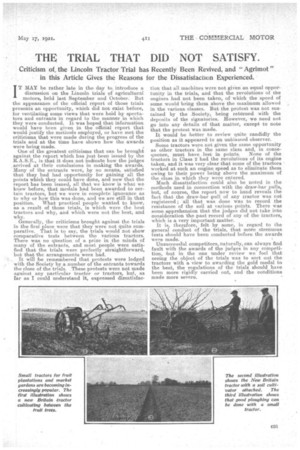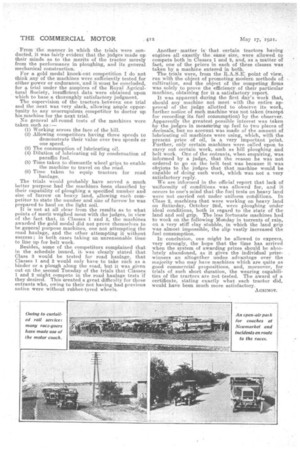• THE TRIAL THAT DID NOT SATISFY.
Page 27

Page 28

If you've noticed an error in this article please click here to report it so we can fix it.
Criticism of, the Lincoln Tractor Trial has Recently Been Revived, and " Agrimot " in this Article Gives the Reasons for the Dissatisfaction Experienced.
IT MAY be rather late in the day to introduce a discussion on the Lincoln trials of agricultural motors, held last September and October: But the appearance of the official report of those trials presents an opportunity, which did not exist before, for ventilating some views that were held by spectators and entrants in regard to the manner in which they were conducted. It was hoped that information would have been given in the official report that would-justify the methods employed, or have met the criticisms that were made during the progress of the trials and at the time have shown how the awards were being made. c One of the greatest criticisms that can be brought against the report which has just !been issued by the R.A.S.E., is that it does not indicate how the judges arrived at their conclusions in making the awards. Many of the entrants were, by no means, satisfied that they had had opportunity for gaining all the points which they could have done, and now that the report has been issued, all that We know is what we knew before, that medals had been awarded to certain tractors, but we were in complete ignorance as to why or how this was done, and we are still in that position. What practical people wanted to know, as a result of those trials, is which were the best tractors and why, and which were not the best, and why.
Generally, the criticisms brought against the trials in the first place were that they were not quite comparative. That is to say, the trials would not show comparative tests between the various tractors. There was no question of a prize in the minds of many of the entrants, and most people were satisfied that the trials were perfectly straightforward, but that the arrangements were bad.
It will 'be remembered that protests were lodged with the Society by a number of the entrants towards the close of the trials. These protests were not made against any particular tractor or tractors, but, as far as I could understand it, expressed dissatisfac
tion that all machines were not given an equal opportunity in the trials, and that the revolutions of the engines had not been taken, of which the speed of some would bring them above the maximum allowed in the various classes. But the protest was not sustained by the Society, being returned with the deposits of the signatories. However, we need not go into any details of that matter, except to note that the protest was made.
It would be better to review quite candidly the position as it appeared to an unbiassed observer. Some tractors were not given the same opportunity as other tractors in the same class and, in conse quence, must have .lost in points. None of the tractors in Class 2 had the revolutions of its engine taken, and it was very clear that some of the tractors worked at such an engine speed as to eliminate them owing to their power being above the maximum of the class in which they were entered. Much dissatisfaction could also be noted in the methods used in connection with the draw-bar pulls, but, of course, the report now to hand reveals the fact that the draw-bar pull of any tractor was not registered ; all that was done was to record the resistance of the soil at various points. There was some apprehension that the judges did not take into consideration the past record of any of the tractors, which is a very important matter. It is, therefore, felt by some, in regard to the general conduct of the trials, that more strenuous tests should have been conducted before the awards were made.
Unsuccessful competitors, naturally, can always find fault with the awards of the judges in any competition, but in the one under review we feel that seeing the object of the trials was to sort out the tractors with a. view to awarding the gold medal to the best, the regulations of the trials should have been more rigidly carried out, and the conditions made more severe. From the manner in which the trials were conducted, it was fairly evident that the judges made up their minds as to the merits of the tractor merely from the performance in ploughing, and its general mechanical construction.
For a gold medal knock-out competition I do not think any of the machines were sufficiently tested for either power or endurance, and it must be concluded, for .a trial under the auspices of the Royal Agricultural Society, insufficient data were obtained upon which to base a thoroughly satisfactory judgment.
The supervision of the tractors between one trial and the next was very slack, allowing ample opportunity to any unscrupulous competitor to doctor up his machine, for the next trial.
No general all-round tests of the machines were taken such as :— (1) Working across the face of the hill.
(2) Allowing competitors having three speeds to demonstrate their value over two speeds or one speed.
(a) The consumption of lubricating oil. (4) Dilution of lubricating oil by condensation of paraffin fuel.
(5) Time taken to dismantle wheel grips to enable the machine to travel on the road.
(6) Time taken to equip tractors for road haulage.
The trials would probably have served a much better purpose had the machines been classified by their capability of ploughing a, specified number and size of furrow on heavy land, allowing each competitor to state the number and size of furrow he was prepared to haul on the light soil. It is not at all clear from the results as to what points of merit weighed most with the judges, in view of the fact that, in Classes 1 and 2, the machines awarded the gold medal did not prove themselves to be general purpose machines, one not attempting the road haulage, and the other attempting it without success ; in both cases taking an unreasonable time to line up for belt work.
Besides, some of the competitors complained that in the schedule issued, it was clearly stated that Class 3 would be tested for road haulage, that Classes 1 and 2 would only have to take such as a binder or a plough along the road, but it was given out on the second TuesdaY of the trials that Classes 1 and 2 might compete in the road haulage tests if they desired. This oreated a great difficulty for those entrants who, owing to their not having had previous notice were without rubber-tyred wheels. Another matter isthat certain tractors having engines all exactly the sine size, were allowed to compete both in Classes 1 and 2, and, as a matter of fact, one of the prizes in each of these classes was taken by a machine entered in both.
The trials were, from the R.A.S.E1 point of view, run with the object of promoting modern methods of cultivation, and the object of the competing firms was solely to prove the efficiency of their particular machine, obtaining for it a satisfactory report.
It was apparent during the first day's work that, should any machine not meet with the entire approval of the judge allotted to observe its work, further notice of such machine was not taken (except for recording its fuel consumption) by the observer. Apparently the greatest possible interest was taken by the judges in measuring up fuel to two places of decimals, but no account was made of the amount of lubricating oil machines were using, which, with the present price of oil, is a very important point. Further, only certain machines were called upon to carry out certain work, such as hill ploughing and belt work. One of the entrants, when enquiring, was informed by a judge, that the reason he was not ordered to go on the belt test was because it was obvious to the judges that. that machine would be capable of doing such work, which was not a very satisfactory reply. We are informed in the official report that lack of uniformity of conditions was allowed for, and it occurs to one's mind that the fuel tests on heavy land were not carried out under uniform conditions. In Class 2, machines that were working on heavy land on Saturday, October 2nd, were ploughing under ideal conditions, both in regard to the state of the land and soil grip. The less fortunate machines had to work on the following Monday in torrents of rain, on a very stiff clay stubble, in which the land grip was almost impossible, the slip vastly increased the fuel consumption.
In conclusion, one might be allowed to express, very strongly, the hope that the time has arrived when the system of awarding prizes should be absolutely abandoned, as it gives the individual prizewinners an altogether undue advantage over the majority who may have machines which are quite as good commercial propositions, and, moreover, for trials of such short duration, the wearing capabilities of the tractors are not tested. The award of a certificate, stating exactly what each tractor did, would have been much more satisfactory.
AGRIMOT.
































